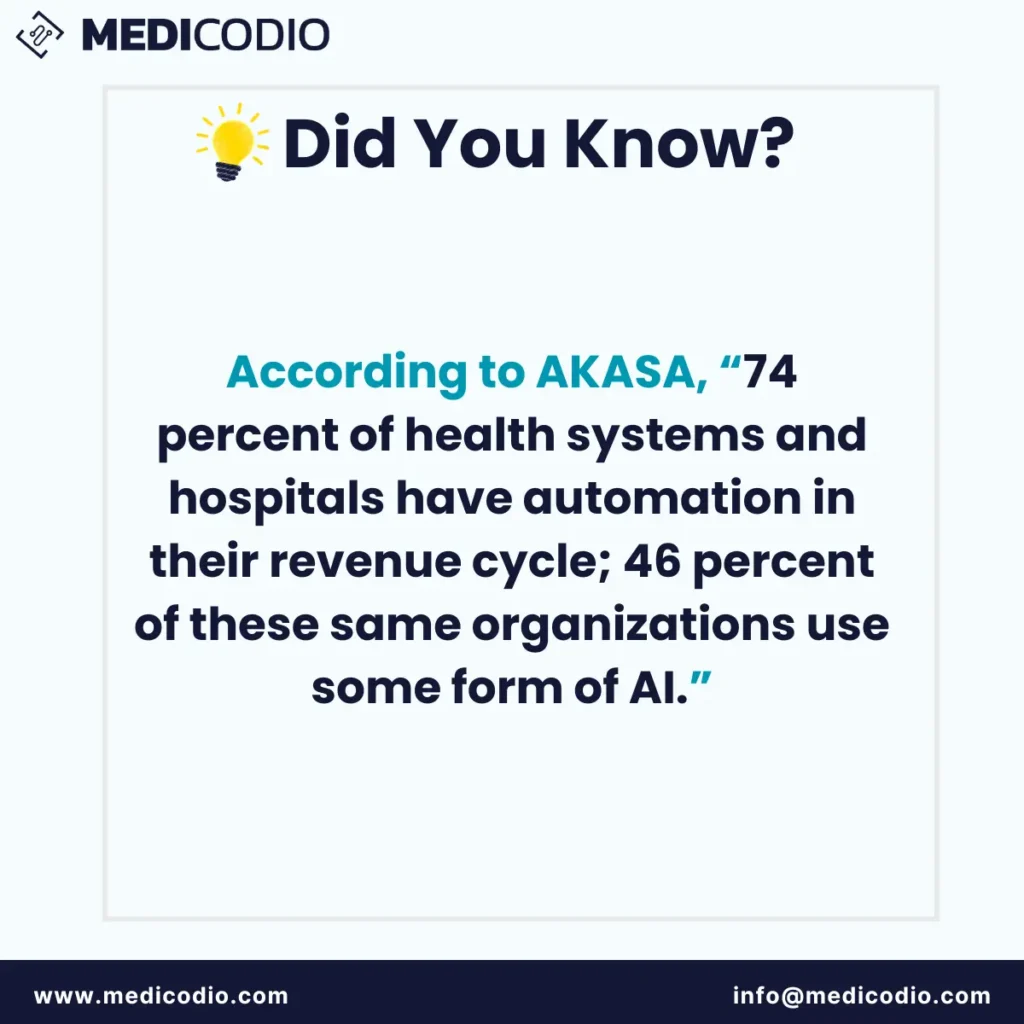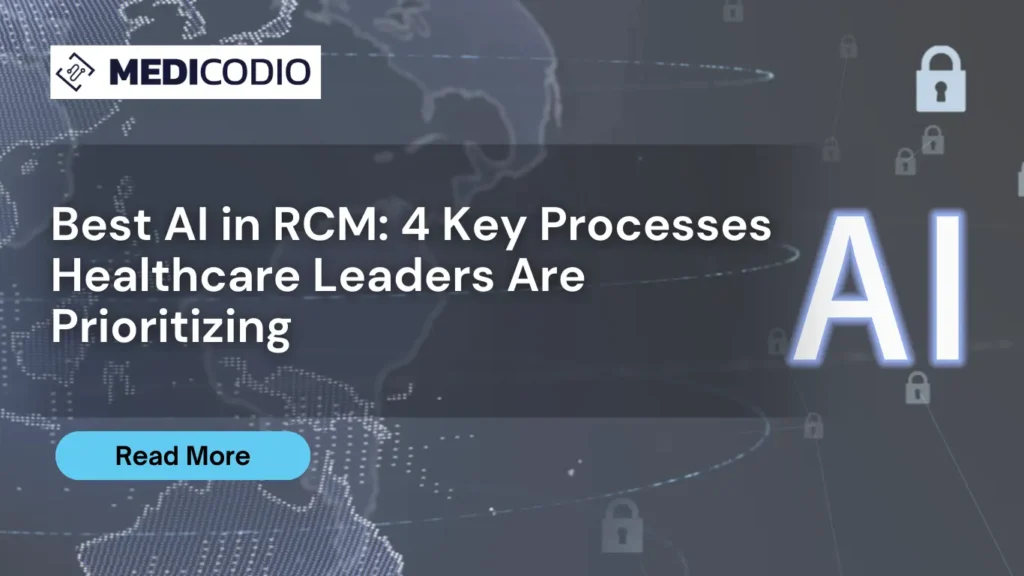Artificial Intelligence has made its way across all healthcare processes and departments. In this article, we are going to focus on how AI is revolutionizing RCM, a crucial process for ensuring timely and accurate billing. Though most of the RCM process can be optimized by AI, healthcare leaders are prioritizing four key processes: medical coding, prior authorization, claim processing, and patient estimates. In this article, we’ll explore the key processes, decode why they are being prioritized during AI implementation, and highlight the best AI in RCM.
In the dynamic realm of healthcare, the quest for the best AI in RCM (Revenue Cycle Management) has become a driving force for transformative change. As healthcare providers strive to optimize revenue streams and streamline operations, AI emerges as a cornerstone technology offering unparalleled efficiency and accuracy. Let’s delve into the world of the best AI in RCM, where innovation meets impact, shaping the future of healthcare revenue management.
Why AI is important for Medical Coding?
According to the American Medical Association, there are two major issues that healthcare facilities are facing in the medical coding process: administrative complexity and skilled medical coder shortage. There is a shortage of 30% of medical coders, making it crucial for healthcare organizations to hire coders as they expand their growth strategies. Along with these issues, ever-changing guidelines and increasing costs have amplified the burden on revenue cycle departments. The impact of these issues varies from staff burnout to backlogs, and delayed payment cycles.
This is precisely where Artificial Intelligence marks its presence.
AI is crucial for medical coding due to its ability to automate and improve the accuracy of the coding process while ensuring accurate reimbursement for services provided. AI can address the above challenges by automating many aspects of the medical coding process. AI algorithms can analyze medical documentation and accurately assign the appropriate codes, reducing the likelihood of errors. This automation not only improves the accuracy of coding but also increases efficiency, allowing organizations to process claims faster and reduce backlogs.
Furthermore, the best AI in RCM can help organizations stay up-to-date with changing coding guidelines. AI algorithms can be trained on new guidelines and updates, ensuring that coding practices remain compliant.
According to the report, healthcare leaders’ satisfaction with the use of the best AI in RCM varies significantly by role. RCM decision-makers are the most satisfied, with 78% reporting satisfaction. However, only 25% of corporate leaders and 46% of IT leaders are satisfied with AI in the Healthcare Revenue Cycle.
One of the best AI for RCm for medical coding is MediCodio. Powered by deep learning and machine learning, CODIO suggests medical codes automatically by reading patient information from EHR systems, physician notes, and charts.

Best AI in RCM: Why Prior Authorization process need AI?
Prior authorization, a process required by insurance companies before approving certain medications, procedures, or services, poses significant challenges due to its manual approach. This manual method often involves lengthy paperwork, phone calls, and faxes between healthcare providers and insurance companies. This can lead to delays in patient care, as providers must wait for authorization before proceeding with treatment. Additionally, the manual nature of this process increases the likelihood of errors, such as incorrect information or missing documents, which can further delay approvals and impact patient outcomes. Moreover, the time-consuming nature of manual prior authorization can strain healthcare resources and increase administrative costs, ultimately affecting both providers and patients.
Enter AI
One of the key reasons for its importance is its ability to automate and streamline the prior authorization process, which is often time-consuming and prone to errors when done manually.
AI algorithms can analyze vast amounts of patient data, including medical records, treatment histories, and insurance information, to determine the necessity and eligibility of a prior authorization request. This analysis helps in reducing the administrative burden on healthcare providers and insurers, allowing them to focus more on patient care.
Moreover, the best AI in RCM can improve the accuracy of prior authorization decisions by identifying potential errors or discrepancies in the request, ensuring that patients receive the appropriate care they need. This can lead to better patient outcomes and satisfaction.
According to McKinsey&Company report, “AI-enabled PA can automate 50 to 75 percent of manual tasks, boosting efficiency, reducing costs, and freeing clinicians at both payers and providers to focus on complex cases and actual care delivery and coordination.”
Tools like Availity AuthAI have taken a significant step towards addressing the inefficiencies in healthcare prior authorization.
How is AI transforming claim processing?
AI is important for healthcare claim processing in healthcare due to its ability to streamline the process, reduce errors, and improve efficiency. Traditional claim processing can be time-consuming and error-prone, leading to delays in reimbursement and increased administrative costs. AI can automate many aspects of claim processing, such as data entry, verification, and adjudication, reducing the need for manual intervention and speeding up the process. This results in faster reimbursement for healthcare providers and improved cash flow.
According to McKinsey, AI will drive the digital transformation of claim processing, making it the most crucial insurance function by 2030.
AI’s positive impact on claim processing is evident in its ability to reduce claim denials and improve accuracy. By analyzing historical claims data and identifying patterns, AI can help identify potential issues before claims are submitted, reducing the likelihood of denials. Additionally, AI can flag claims that require further review, allowing for more efficient use of resources and faster resolution of disputes.
Another best AI in RCM process includes Nanonets, which offers AI-driven solutions that empower healthcare organizations, insurers, and all stakeholders involved in the claims processing ecosystem.
How is AI estimating the cost and satisfaction level of patients?
AI is important for patient estimates in healthcare as it can help providers accurately estimate the cost of care upfront. This is particularly useful for patients with high-deductible health plans or no insurance, as it allows them to plan for the cost of their care and avoid unexpected bills. To calculate patient estimates, previously providers usually relied on traditional tools that use standard algorithmic functions. However, AI can analyze factors such as procedure codes, insurance coverage, and historical data to generate accurate estimates, improving price transparency and patient satisfaction.
The positive impact of AI on patient estimates is evident in its ability to reduce billing errors and improve patient trust. By providing accurate estimates, AI can help reduce the likelihood of billing disputes and improve patient satisfaction. Additionally, by improving price transparency, AI can help patients make more informed decisions about their care, leading to better outcomes.
A survey report by the Healthcare Financial Management Association (HFMA) found that 78% of healthcare providers believe that AI can improve revenue cycle processes, including claim processing and patient estimates. This highlights the growing recognition of AI’s importance in these areas and its potential to transform the healthcare industry for the better.
In conclusion, the adoption of the best AI in RCM holds immense promise for streamlining revenue cycle processes, enhancing efficiency, and improving patient care in the healthcare industry. Embracing AI technologies can lead to significant cost savings, reduced administrative burden, and ultimately, better financial outcomes for healthcare providers. The increasing recognition of AI’s potential underscores the urgent need for its integration into revenue cycle management practices across the healthcare sector.
Read more: The best AI in RCM: Why RCM Companies Need AI Medical Coding Tools?
Learn more about AI in medical coding in our upcoming webinar: Click here!





